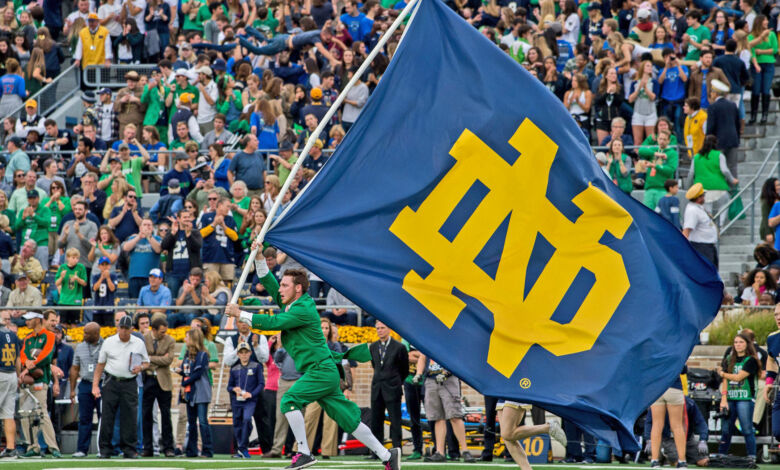
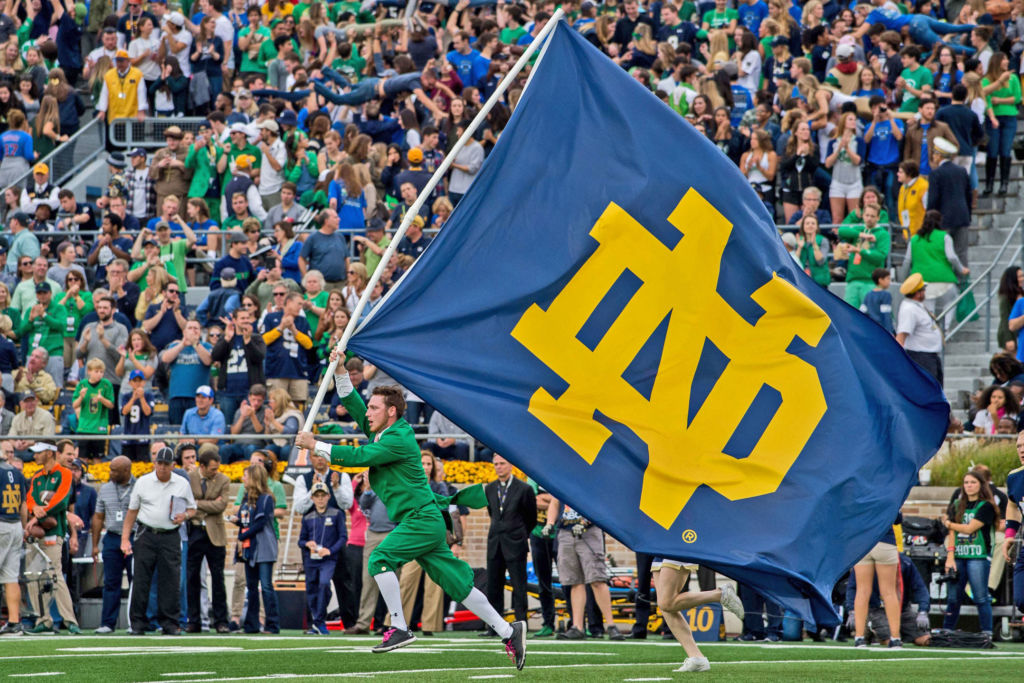
With Signing Day all wrapped up and weeks until spring football, we’ve hit one of the dreaded lull periods on the football calendar. This year, however, there has been so much going on around the Notre Dame program that there is PLENTY for us to dive into over the next few weeks. So we called in an expert – football analyst Bryan Driskell at Blue & Gold Illustrated.
“Coach D” as some of you may know him from his Twitter handle (@BGI_CoachD) is a former coach who provides excellent commentary at BGI and was kind enough to answer A LOT of questions for us and provide a ton of great insights into the current state of the program.
Note: This is the kind of in-depth analysis that Bryan produces daily for BGI. Blue & Gold Illustrated is also having a 30-day free trial. Get caught up on the latest in Notre Dame football, basketball and recruiting coverage.
With all of that in mind, lets jump right into the Q&A.
Program Related Q’s
Q: What do you think were the biggest shortcomings of the Notre Dame S&C program the last few years? Do you think the additions of Matt Balis and David Ballou can change the course and fix those shortcomings?
A: Notre Dame had several problems with its strength program in recent seasons. To begin with, too many players either stagnated from a strength standpoint, or they regressed. The most glaring example was defensive end Isaac Rochell, who played with more power as a sophomore than he did as a senior.
The Irish also struggled to finish off games the last several years. Think about all the games Notre Dame lost in the fourth quarter, or failed to close out late in games. Florida State, Arizona State, Northwestern and Louisville in 2014. Clemson and Stanford in 2015. Texas, Michigan State, Duke, NC State, Stanford, Navy and Virginia Tech in 2016.
Finishing games is part execution, part mental toughness and part physical strength/endurance. The strength program was largely responsible for developing mental toughness and endurance, and it failed to do so. Notre Dame’s players were simply not challenged enough in the weight room. The program did not create the necessary power to develop its players, or to progress them as they should have.
Regarding Balis and Ballou, they seem to combine the necessary mix of old school training that emphasizes power, explosiveness and competition with some of the new school techniques that include nuances in nutrition and properly integrating sports science.
Q: We published a post this week on Notre Dame playing catch up in a number of areas: recruiting infrastructure, strength & conditioning/nutrition, and facilities specifically. In your opinion, what can Notre Dame do to compete with the Alabamas and Ohio States when the Notre Dame name appeal isn’t enough?
A: The Notre Dame appeal is enough in my opinion, and this is where I disagree with many of my colleagues. There are a lot of players – including elite prospects – that are looking for a reason to come to Notre Dame.
It’s no coincidence that Notre Dame’s best classes over the last decade followed periods where it won a lot of games. Charlie Weis brought in elite players after taking Notre Dame to back-to-back BCS games. When Brian Kelly led Notre Dame to a 12-1 record and a trip to the BCS title game, Notre Dame finished that season with the No. 3 class in the country according to Rivals. That class included Jaylon Smith, Will Fuller, Cole Luke, Isaac Rochell, Mike McGlinchey, Tarean Folston, Cole Luke, etc.
Notre Dame needs to win. It needs to stop getting in its own way. Coaching mistakes and failures to execute cost Notre Dame too many games it should have won. There is no excuse to have lost to Tulsa and Navy in 2010; South Florida, Michigan and Florida State in 2011; Pittsburgh in 2013; Northwestern and Louisville in 2014.
If Notre Dame wins those games – games where they weren’t out-played but either out-executed or out-coached – it’s a 10-win team every year. If Notre Dame is winning 10 games a year, its producing Top 10 caliber classes every season.
Kelly has made some mistakes when it comes to hires as well. Bringing in Brian VanGorder was a mistake that set the program back. Keeping Scott Booker in charge of the special teams for five years was a mistake.
His hires this offseason were outstanding, which leads to cautious optimism regarding a possible turnaround.
Notre Dame’s recruiting machine was quite disorganized up to the point where Mike Elston took over as the recruiting coordinator. The new staff is deeper when it comes to grinders and effective recruiters. That should be a major plus.
Facilities upgrades would be nice and would certainly provide a more aesthetically pleasing campus visit, but kids want to play for winners, and they want to be developed for the next level. If Notre Dame’s facilities aren’t up to snuff, kids with a natural inclination to play for them won’t care as long as the product on the field is top notch.
Q: Whenever there is a lot of staff turnover there is concern that it might take a while for the new systems to get picked up by the players, the staff to gel, and results to show in the form of wins. Under Brian Kelly though, Notre Dame has had their best seasons after staff shakeups. Why do you think that is and what are your thoughts on the newly formed Notre Dame staff?
A: There are a number of reasons. New hires force competition. A new coach is unlikely to automatically declare starters or continue what the previous coach had in place. Being unfamiliar with the new coach often forces players to be more on edge, to be more focused knowing they have to make a good impression, and knowing they have to compete for jobs.New voices can often create an immediate boost In energy level. Also, a lot of those new hires were also upgrades. Ed Warinner is a good offensive line coach, but Harry Hiestand is better. Moving Tony Alford back to running backs and Mike Denbrock out to wide receivers created a better situation. In 2015, bringing in Mike Sanford, Autry Denson and Todd Lyght provided an overall upgrade.
I’m quite impressed with the new staff. As recruiters, they are grinders and did an excellent job finishing off the 2017 class. Their background as coaches is impressive. Chip Long inherited a Memphis offense that lost a first round NFL Draft pick at Memphis, its top wide receiver and several other top players, but the Tigers thrived with him calling the offense.
Mike Elko has built outstanding defenses at both Bowling Green and Wake Forest. I first met him back in 2013 when he was at Bowling Green, and he’s always impressed me as an excellent teacher. His defense is aggressive but sound, something that Jon Tenuta and Brian VanGorder’s defenses were not.
DelVaughn Alexander is a coach I have followed going back to his Wisconsin days, and he’s a strong wide receivers coach. Clark Lea knows Elko’s defense and should fit in quite well with the Irish. Brian Polian is a huge upgrade as a special teams coordinator.
Q: As of February 2017, how confident are you that all of the changes Notre Dame & Brian Kelly have made this off-season will result in a rebound season in 2017?
It’s too early to tell. Is it too late for the new hires to really make an impact? What is the psyche of the returning players? Is the 2017 schedule too difficult? How will the new hires work together? Is the depth good enough for the team to really thrive?
It’s just too early to really get a feel. The best I can say is that I’m cautiously optimistic, but after a 4-8 season every Notre Dame fan should be in “show me” mode.
Personnel & Development Related Q’s
Q: Notre Dame has done well with identifying some under-recruited WRs under Brian Kelly. What do you look for in a wide receiver recruit and what is something that you think is an overrated trait and why?
A: What I look for varies by position and by each player. I’m not going to look for the same thing out of a CJ Sanders type prospect as I will from an Equanimeous St. Brown type of player. I’m looking for something different from the boundary player than I am the field player, if that’s what the offense asks for.
There are a few traits that I look for in every wide receiver. Ball skills are obviously important. This term encompasses a lot of different things. Ball skills involve the strength of a player’s hands, literally. Can he grab the ball out of the air when challenged. Can he snatch it and bring it in with authority. I like a receiver with fast and soft hands. When you hear a guy catch a ball at camp, you want it to be quiet when it hits his hands. I want a guy who tracks the ball well, even in traffic. I want a guy who can high point the football down the field.
Ball skills also involves being able to manipulate your body in order to keep your body between the ball and the defender.
Ideally, you want a receiver with quick feet and a guy who has fluid enough hips to quickly get into and out of breaks.
The most overrated trait to me is speed, which is rarely received well when I say it. This doesn’t mean speed isn’t great. Will Fuller dominated primarily with speed, and if a guy can really run that’s quite a weapon. Having said that, far too many coaches miss on players because they either fall in love with the speed of a prospect who lacks the other necessary traits, or they pass on a guy who lacks speed but has excellent traits in other areas.
Do I want a receiver with speed? Absolutely, but only if he has the ball skills, intelligence, toughness and instincts to be an elite player. We’ve seen elite speed guys struggle as wide receivers because they lacked those traits.
Q: Notre Dame has struggled to recruit defensive ends and has had to take some chances on players they need to develop the last few years. What do you look for in a raw pass rusher as an indicator they can develop on the next level and who on the current Notre Dame roster do you think can develop into a real pass rusher for the Irish?
A: This is where I disagree with a lot of folks who cover Notre Dame, and a lot of fans. Under Brian Kelly, Notre Dame has signed four five-star ends: Aaron Lynch, Ishaq Williams, Stephon Tuitt and Daelin Hayes. It has signed Andrew Trumbetti, a Top 100 player according to ESPN and Scout. It signed Romeo Okwara, who now starts at end for the New York Giants. It signed Isaac Rochell, a consensus Top 200 player. It signed Julian Okwara, a four-star end, and it signed Khalid Kareem, a four-star end who ranked No. 124 nationally according to ESPN.
If you can’t produce top-level production with that kind of talent, your problem isn’t recruiting, it’s development. Clemson went to the title game in 2015 with Shaq Lawson playing one end spot and Kevin Dodd playing the other spot. Lawson was an unranked four-star end according to Rivals and Dodd was a three-star recruit. They had raw tools and those tools were developed.
When looking for an end who can rush the quarterback I look for several traits. When it comes to a speed rusher, I want a guy with a great first step off the line. I want a guy with strong and fast hands. I want a guy who can dip and rip around the edge. I prefer a guy with loose enough hips to change direction well, which means he’ll develop a nice array of secondary moves. Instincts are important for any position. Closing speed is also key, as that second gear around the edge can be the difference between a hurry and a sack.
On the strong-side, you want a guy that is powerful enough to set the edge, to beat double teams and to destroy blocks when the ball comes his way. As a pass rusher, you want the same traits listed above.
What does Brandon Wimbush bring to the table – if anything – that Deshone Kizer and Malik Zaire may not have?
Wimbush is sort of a combination of those two players. Wimbush has the strongest arm of the group. He’s a more natural passer than Zaire, but he has Zaire’s passion and leadership traits. He’s faster than Kizer, although DeShone developed into a good runner at Notre Dame. Wimbush is also more elusive than Kizer.
Wimbush has all the physical tools you want in an elite quarterback, but at St. Peter’s Prep he was also a tremendous leader, and someone who inspired his teammates to play their best.
Which offensive player will benefit the most from new OC Chip Long and which defensive player will benefit most from new DC Mike Elko?
Pick a tight end, any tight end. Notre Dame simply did not use its tight ends under Mike Denbrock and Mike Sanford.
Defensively, its hard to pick just one guy. Donte Vaughn, Khalid Kareem, Daelin Hayes, Elijah Taylor and both of the sophomores safeties – Devin Studstill and Jalen Elliott – should flourish in this defense. If I had to pick one guy on that side of the ball I’d go with Nyles Morgan. Wake Forest’s Mike linebacker – Marquel Lee – had 105 tackles, 20 tackles for loss and 7.5 sacks last season. It would be surprising if Morgan did not come close to those types of numbers.
Recruiting Related Q’s
Of the 3-star recruits Notre Dame signed – which do you think have the best chance to become impact players and multi-year starters for Notre Dame?
In the 2017 class, the three guys with the most talent and upside of the three-stars – according to Rivals – are Jeremiah Owusu-Koramoah, Drew White and Kofi Wardlow. I graded Owusu-Koramoah and White out as four-star players, and Wardlow has more upside than any defensive lineman signed in the class. Wardlow has only played football for two years, and like Ade Ogundeji in the 2016 class, if he can fill out his body and enhance his technique he could be really, really good.
How much better do you think the class of 2017 would have been if Notre Dame had been 10-3 again this season instead of 4-8?
It would have been a Top 5 caliber class. It likely wouldn’t have lost as many players as it did and it would have added a few more top level players. It was a borderline Top 5 class for most of the year, but the defections and inability to close out with elite players cost it a finish in the Top 10. Even with the struggles on the field, Notre Dame’s class still finished the season ranked No. 13.
Very special thanks for Coach D for answering all of our questions and providing our readers with some great insights into the current state of the Notre Dame program. Again, Blue & Gold Illustrated is currently having a 30-day free trial!
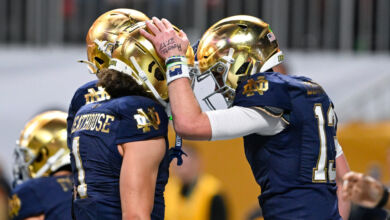
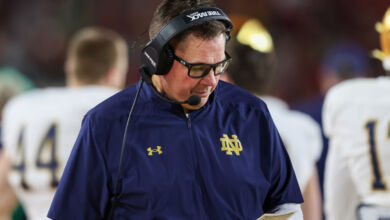
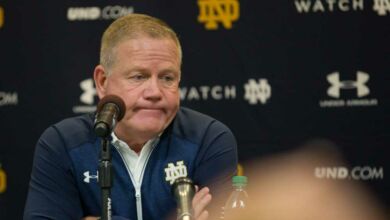
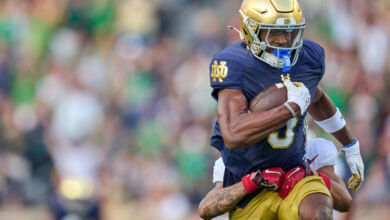

It’s a lost cause with bk
A good reading piece and some fair analysis & assessment of the areas mentioned in the article.
Well said
Enjoyed and agreed with the article. It seems to me that BK was slow to realize that Strength & Conditioning was subpar, and also stuck with BVG way too long. The whole vibe concerning Irish football was off. I like the coaching additions/changes. The Irish need to prepare better. Sloppy play needs to be eliminated. We need to play smash-mouth football, with speed and ferocity. If anything, Notre Dame needs to be the best conditioned and strongest team on the field for every game. No team should tackle better or hit harder than the Irish. No team should block better than Notre Dame. Work on those things and the rest, with good coaching and play calling, will fall into place.
Well stated Mr. O’Cat. There is no excuse for your players getting more tired than the opposition. The opposition might be flat out better but our guys should never run out of gas. That was happening all too often last year. What I do not know is if they were really tired out or whether they just didn’t care by the end of the game. Either way – it is unacceptable and much as I hate to say it, the onus is on the coaching staff for preparing your team to play – physically and mentally.
2017? Always optimistic. Go Irish!!!
I’m with you, Mr. Sinclair.
GO IRISH!
You mean like Stanford?
An interesting article. I’m not quite as optimistic, though I too an cautiously optimistic about the staff additions. The tools are there for a good season. Will BK and co use them effectively or squander them? I guess we’ll have to wait until next season to really know the answer (though the Blue Gold game will give us some hints).
Excellent article to fill the void. Thanks Frank and Brian
Good Stuff!
Thanks Frank and Coach D!!!